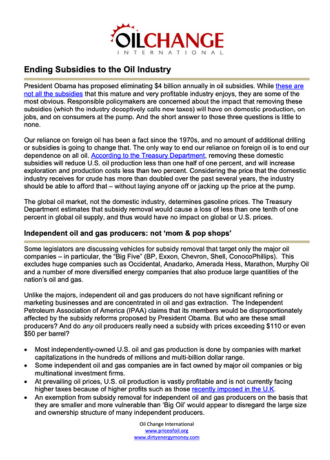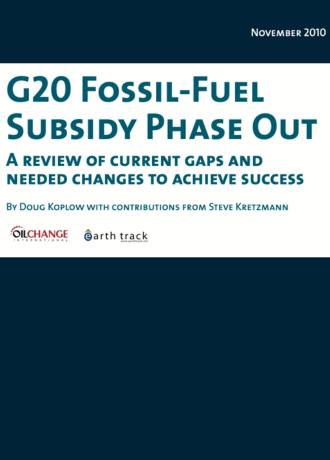
Oil and Investor Risk
Private international oil companies have limited opportunities for growing their oil production. They have been forced to go to the extremes to pursue oil wherever they can get it.
Oil Change International publishes upwards of 20 reports and briefings every year focused on supporting the movement for a just phase-out of fossil fuels.

Private international oil companies have limited opportunities for growing their oil production. They have been forced to go to the extremes to pursue oil wherever they can get it.

As the U.S. Congress debates several measures to remove oil industry subsidies, we have published a new factsheet that overviews some of the key issues in the subsidy debate.

The U.S. already imports over 2 million barrels a day from Canada. It did not protect us from rising prices in 2008, it hasn’t this time, and it never will.
Our research found that at least four of the top six IOCs have significantly relied on tar sands reserves additions to support RRR rates in the past five years. As a percentage of total liquids additions, tar sands represents between 26% and 71% of reserves additions for these four companies.

This report, prepared by Oil Change International and Earth Track, is the first independent evaluation of the success of the G20 Pledge to phase out fossil fuel subsidies. The report reveals large gaps in the reporting of subsidies and that no new actions have been taken by G20 nations as a result of their commitment in Pittsburgh to phase out fossil fuel subsidies.

This study finds that none of the World Bank Group’s fossil fuel finance directly targets the poor or ensures that energy benefits are reaching the poor.

This report reveals that petroleum products containing tar sands crude oil have been regularly entering the EU’s petroleum supply chain for some time, primarily through imports of diesel from the US Gulf Coast. If the proposed Keystone XL pipeline is built, bringing tar sands from Alberta to Gulf Coast refineries, the amount of tar sands derived diesel entering Europe will rise dramatically.

This new research paper rates the carbon intensity of the top international oil companies, revealing that Shell is now the most carbon intensive oil company in the world based on its total resources.